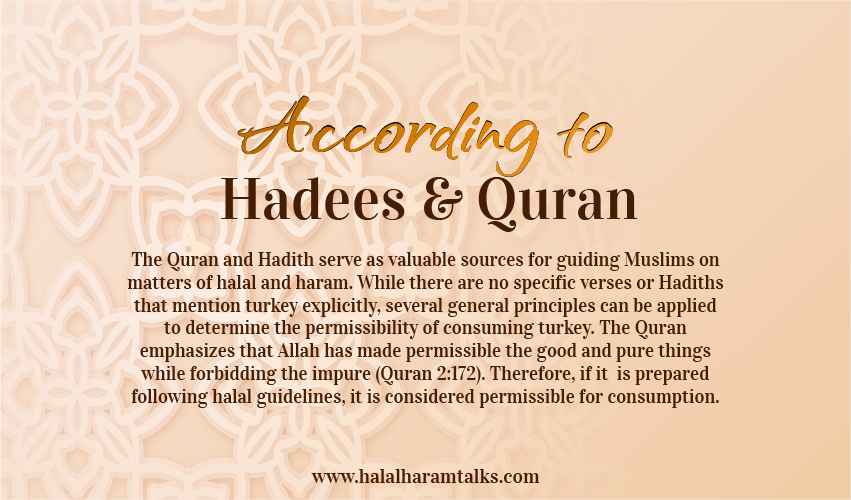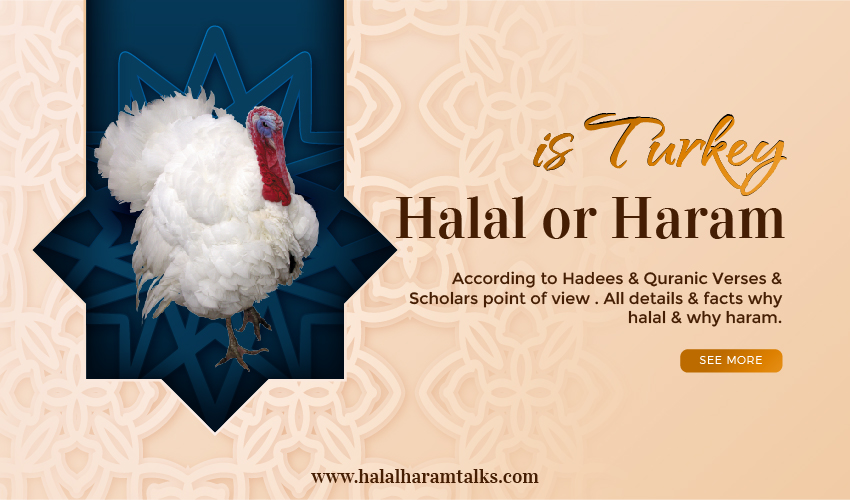In the Islamic dietary laws, known as Halal, it is crucial for Muslims to ensure that the food they consume is permissible and prepared in accordance with Islamic guidelines. This article explores the topic of whether the turkey is Halal or Haram (permissible or forbidden) in Islam. We will examine the ingredients used in turkey products, explore relevant Quranic verses and Hadiths, delve into the question of the halal status of their various products, discuss perspectives from the four primary schools of thought, and consider the role of certification in determining the Halal status of it.
Turkey is a widely consumed meat globally and a popular alternative to other meats. However, for Muslims, it is essential to ascertain if itfalls within the boundaries of Halal food, given its increasing prevalence in everyday diets.
Is Turkey Halal or Haram
Determining whether the turkey is halal or haram depends on the method of slaughtering the bird and the use of specific ingredients. Islam mandates that animals be slaughtered by following specific guidelines. The process, known as dhabihah, involves swiftly severing the animal’s throat while invoking the name of Allah. When it comes to turkey, as long as the bird is slaughtered according to Islamic principles, it is considered halal.
For More: Is Rabbit Meat Halal: A Quick Explanation
Quran Verse or Hadith Referring to the Halal or Haram Status of Turkey
The Quran and Hadith serve as valuable sources for guiding Muslims on matters of halal and haram. While there are no specific verses or Hadiths that mention turkey explicitly, several general principles can be applied to determine the permissibility of consuming turkey. The Quran emphasizes that Allah has made permissible the good and pure things while forbidding the impure (Quran 2:172). Therefore, if it is prepared following halal guidelines, it is considered permissible for consumption.
For More: Is Horse Meat Halal or Haram: Explained With Proof

Is Turkey Meat Halal?
Turkey meat is considered halal as long as it has been slaughtered in accordance with Islamic principles. Muslims are required to perform the dhabihah slaughter, as mentioned earlier, and ensure the absence of cross-contamination with non-halal substances.
For More: Is Crab Halal Or Haram Yes/No
Is Turkey Sausage Halal?
The permissibility of turkey sausage depends on the ingredients used in its preparation. While its meat itself may be halal, it is crucial to examine the other ingredients, such as casings and flavorings, to determine if they comply with halal standards. These ingredients must not contain any non-halal elements, such as pork-based casings or alcohol-based flavorings.
For More: Is Squid Halal
Is Turkey Spam Halal?
Turkey spam, or any processed turkeys product, must meet halal criteria for it to be considered permissible. Similar to other products, the presence of non-halal ingredients, such as pork, would render it haram.
For More: List Of Halal Seafood: The Ultimate Guide
What Is Halal Turkey?
Halal turkey refers to its meat that has been prepared following Islamic principles, primarily through the dhabihah slaughter method. It ensures that turkey is permissible for consumption by Muslims.
For More: Is Octopus Halal: A Proper Insight
Is Turkey Breast Halal?
Turkey breast, being a part of its meat, is considered halal if it has been sourced and processed according to Islamic guidelines. The halal status remains the same as long as the its breast is free from any non-halal elements.
For More: Is Shrimp Halal Or Haram
Is Turkey Pepperoni Halal?
Turkey pepperoni, much like other processed products, must meet halal standards. It is crucial to verify the ingredients used, ensuring they are free from any pork or non-halal substances.
For More: Is Lobster Halal All You Need To Know
Is Turkey Halal According to Primary Schools of Thought
When examining the halal or haram status of it, it is helpful to consider the perspectives of the four primary schools of thought – Sunni, Shia, Hanafi, and Shafai. While there might be minor differences in opinions, the consensus is that turkey, when prepared following halal guidelines, is permissible for consumption.
For More: Is Dave’s Hot Chicken Halal
The Role of Certification in Determining if Turkey is Halal
Certification plays a vital role in determining the halal status of it and other food products. Halal certifying bodies ensure that the entire process, from the sourcing of it to its processing and packaging, adheres to Islamic principles. Such certifications provide Muslims with assurance that the product they are consuming is halal.
FAQs
While it is not mandatory to have halal certification for their products, obtaining certification from reputable halal certification bodies provides assurance to consumers that the product has been produced and processed in accordance with Islamic guidelines. Halal certification can help Muslims make informed choices and have confidence in the halal status of it they purchase.
When purchasing it from non-Muslim sellers, it is important to verify the halal status of the product. If the source of it is known to be halal and the processing has been done according to Islamic guidelines, it may be permissible to consume without specific halal certification. However, obtaining certification from reputable halal certification bodies provides an additional layer of certainty.
If you have consumed it and are unsure about its halal status, it is recommended to repent to Allah and seek forgiveness. As Muslims, we should strive to consume only halal food and be cautious about the dietary choices we make. To avoid any confusion or doubt, it is advisable to seek out their products with reliable halal certification or consult with knowledgeable individuals who can guide you in matters of halal and haram.
Conclusion
It can be considered halal if it is sourced, slaughtered, and processed in accordance with Islamic guidelines. Muslims should ensure the absence of any non-halal ingredients, such as pork or alcohol, in their products. The dhabihah method of slaughter is essential, and it is important to verify the list of ingredients used in processed products to ensure their compliance with halal standards.
While there may not be specific Quranic verses or Hadiths that specifically mention it, the general principles of halal and haram can be applied. The Quran emphasizes the consumption of what is good and pure, while abstaining from the impure (Quran 2:172). This principle can guide Muslims in determining the permissibility of consuming turkey.
In conclusion, it can be considered halal when it is sourced, slaughtered, and processed following Islamic principles. Muslims should be mindful of the ingredients used in their products and ensure that they are free from non-halal substances. To learn more about halal and haram, visit our website for comprehensive information and guidance.
